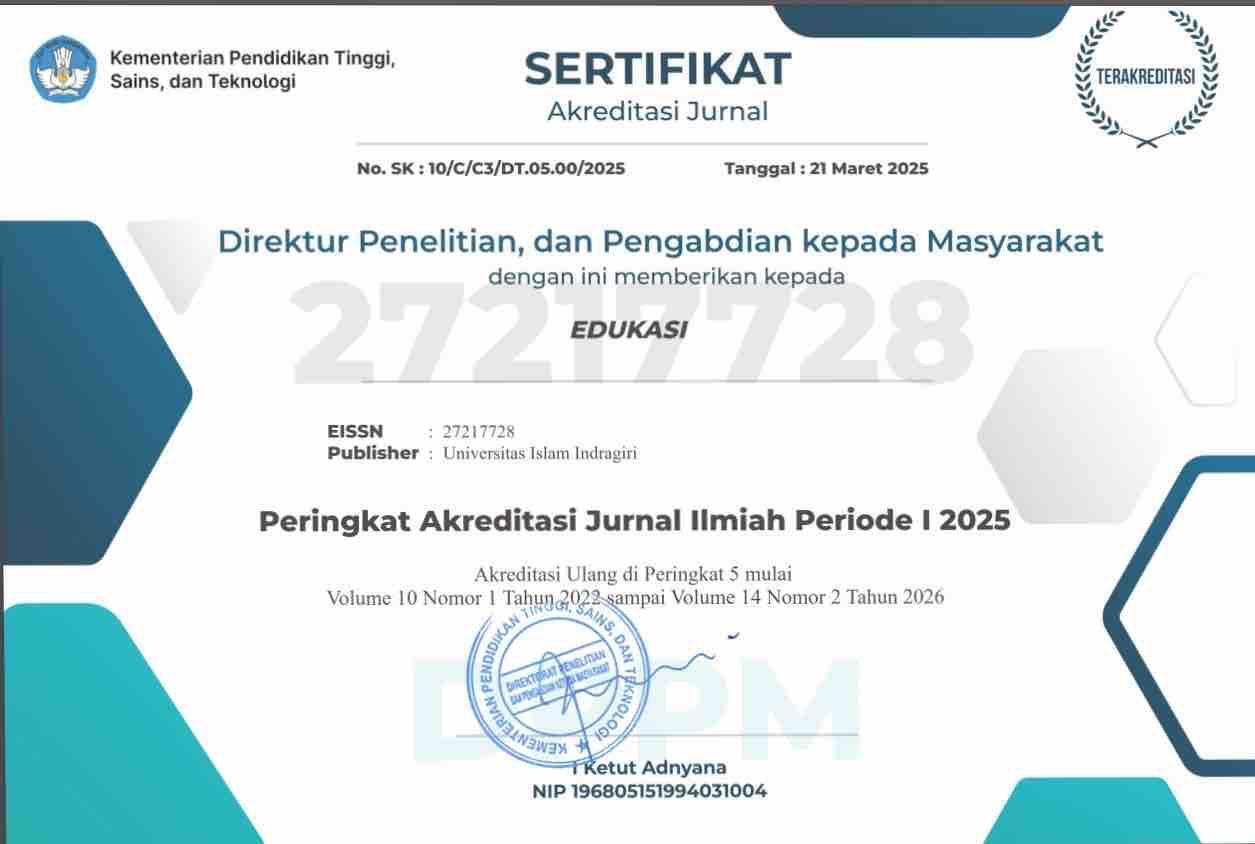The Impact Of Creativity And PKWU Learning Achievement On Entrepreneurial Interest Among High School Students: A Case Study Of SMA Negeri 6 Depok
DOI:
https://doi.org/10.61672/judek.v13i1.2925Keywords:
Creativity, entrepreneurial interest, entrepreneurship education, pkwu, structural equation modeling.Abstract
This study explores the influence of creativity and academic performance in the Prakarya dan Kewirausahaan (PKWU) subject on entrepreneurial interest among high school students at SMA Negeri 6 Depok. As entrepreneurship education becomes increasingly critical in addressing youth unemployment, understanding the factors that drive students' entrepreneurial aspirations is vital. The research uses a quantitative approach, employing Structural Equation Modeling (SEM) to analyze data from 200 grade 12 students. Results reveal that both creativity and PKWU learning achievement positively and significantly affect entrepreneurial interest, with PKWU learning achievement having a stronger impact. These findings suggest that while creativity fosters innovative thinking, the practical skills provided through PKWU have a more direct influence on students' entrepreneurial ambitions. The study concludes by emphasizing the importance of integrating practical entrepreneurial experiences and creativity in educational curricula to cultivate a well-rounded entrepreneurial mindset. Limitations and future research directions, including expanding the sample size and using a longitudinal design, are discussed.
Keywords: Creativity; entrepreneurial interest; entrepreneurship education; pkwu; structural equation modeling.
Downloads
References
Arbuckle, J. L. (2016). AMOS 24.0 User’s Guide. IBM SPSS.
Bryman, A. (2012). Social Research Methods (4th ed.). Oxford University Press.
Byrne, B. M. (2010). Structural Equation Modeling with AMOS: Basic Concepts, Applications, and Programming (2nd ed.). Routledge.
Cochran, W. G. (1977). Sampling Techniques (3rd ed.). John Wiley & Sons.
Cohen, J. (1988). Statistical Power Analysis for the Behavioral Sciences (2nd ed.). Lawrence Erlbaum.
Cohen, L., Manion, L., & Morrison, K. (2013). Research Methods in Education (7th ed.). Routledge.
Creswell, J. W. (2003). Research design Qualitative quantitative and mixed methods approaches. Research Design Qualitative Quantitative and Mixed Methods Approaches. https://doi.org/10.3109/08941939.2012.723954
Dagan, H. (2020). Achievement and Motivation in Education. Springer.
Kementerian Pendidikan dan Kebudayaan. (2013). Kurikulum 2013: Implementasi Mata Pelajaran Prakarya dan Kewirausahaan. Indonesia Ministry of Education.
Darpujiyanto. (2010). Pembelajaran yang Menumbuhkan Minat Mahasiswa Berwirausaha. Jurnal Ilmiah Bisnis Dan Ekonomi ASIA, 5(1), 21–48.
Dimyati, & Mudjiono. (2009). Belajar dan Pembelajaran. Rineka Cipta.
Fraenkel, J. R., & Wallen, N. E. (2012). How to Design and Evaluate Research in Education (8th ed.). McGraw-Hill.
Hair, J. F., Black, W. C., Babin, B. J., & Anderson, R. E. (2010). Multivariate Data Analysis (7th ed.). Prentice Hall.
Hu, L. T., & Bentler, P. M. (1999). Cutoff Criteria for Fit Indexes in Covariance Structure Analysis: Conventional Criteria Versus New Alternatives. Structural Equation Modeling: A Multidisciplinary Journal, 6(1), 1–55.
Januardi, R., Anggraini, Z., & Zubaimari. (2018). The Influence of PKWU Subject on Entrepreneurial Interest of Students in SMA Muhammadiyah 02 Palembang. Journal of Educational Research.
Likert, R. (1932). A Technique for the Measurement of Attitudes. Archives of Psychology, 140, 1–55.
Maryuni, Y., Wibowo, T. U. S. H., & Rosdiana, H. (2022). Teaching Indonesian Maritime History: an Ecopedagogy Approach. International Seminar on Social Studies and History Education, 1(1), 289–305.
Munandar, S. C. U. (1992). Mengembangkan bakat dan kreativitas anak sekolah : petunjuk bagi para guru dan orang tua. Gramedia Widiasarana Indonesia.
Munandar, U. (2012). Creativity and Entrepreneurship: Cognitive and Personality Factors. Indonesian Journal of Education and Psychology.
Nugraheni, W., & Mustikawati, R. I. (2022). Pengaruh Prestasi Belajar Prakarya dan Kewirausahaan, Efikasi Diri, dan Lingkungan Keluarga Terhadap Minat Berwirausaha Siswa Kelas XI IPS. Kajian Pendidikan Akuntansi Indonesia (KPAI), 11.
Pujianingsih, L. (2013). Relationship Between Entrepreneurial Interest and PKWU Achievement in High School Students. Journal of Entrepreneurship Education.
Puspitasari, Q. D., & Wibowo, A. (2021). Creativity in Entrepreneurship: A Psychological Perspective. Journal of Innovation Studies.
Ramayah, T., & Harun, Z. (2005). Entrepreneurial Interest and Its Determinants Among University Students. International Journal of Entrepreneurship and Small Business.
Sekaran, U., & Bougie, R. (2016). Research Methods for Business: A Skill-Building Approach (7th ed.). Wiley.
Slameto. (2010). Learning and Achievement: Key Factors in Educational Success. Journal of Educational Studies.
Sulistyarini, M. (2007). Pengaruh kreativitas kemandirian dan prestasi akademik terhadap minat berwiraswasta siswa sekolah menengah kejuruan : studi kasus SMK Putra Tama Bantul Yogyakarta. Universitas Sanata Dharma.
Suryana. (2009). Entrepreneurship: Practical Theory and Application. Salemba Empat.
Zimmerer, T. W. (2020). Entrepreneurship and New Venture Formation (5th ed.). Pearson.








